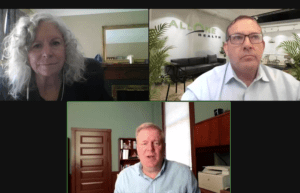Who is a member?
Our members are the local governments of Massachusetts and their elected and appointed leadership.

EAP professional and clinician Katie Gilfeather (top left), AllOne Health Regional Executive Director Michael Stuart (top right) and Sandwich Town Manager Bud Dunham discuss conflict management during an MMA webinar on Nov. 2.
An MMA webinar on Nov. 2 covered effective conflict management and de-escalation strategies that local officials can use to reduce tensions that can arise with constituents.
Nearly 400 attendees heard clinicians from AllOne Health provide an overview of conflict and its primary causes, and share examples of conflict in public meetings, as well as prevention strategies.
Regional Executive Director Michael Stuart began the session by discussing the difference between healthy and unhealthy conflict, as well as common causes. He stressed the importance of engaging in active listening and considering different perspectives to de-escalate contentious conversations.
EAP professional and clinician Katie Gilfeather explained how anger is a default setting for many people. She highlighted the importance of listening beyond anger, recognizing the brain’s default response, and responding instead of reacting.
Stuart and Gilfeather offered solutions for addressing emotionally charged constituents and ending abusive conversations. They also proposed responses that can be used to foster open communication with constituents when there is a shift from a focus on the problem to an indictment.
The session wrapped with principles that normalize conflict, emphasize understanding, and empower appointed and elected officials to use a growth mindset that meets anger with empathy.
Sandwich Town Manager Bud Dunham moderated the Q&A, where attendees raised questions about setting boundaries and navigating escalated encounters.
• Effective Conflict Management: De-escalation Strategies – MIIA presentation (2.5M PDF)